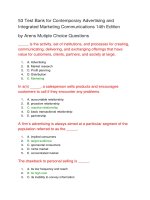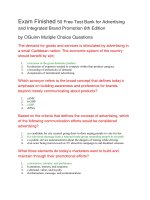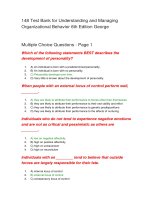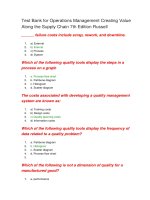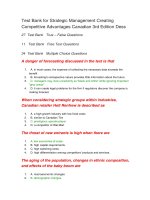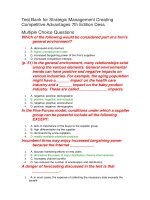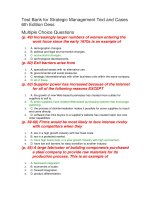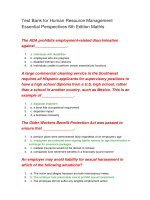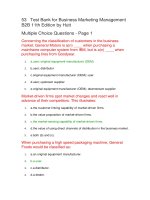53 test bank for selling today creating customer value 6th
Bạn đang xem bản rút gọn của tài liệu. Xem và tải ngay bản đầy đủ của tài liệu tại đây (40.98 KB, 11 trang )
53 Test Bank for Selling Today Creating Customer Value
6th
Edition by Manning Mutiple Chocie Questions - Page 1
Psychic income in selling refers to which one of the following?
1.
2.
3.
4.
5.
A) the opportunity to be a member of the sales team
B) high commissions due to successful "intuitive" selling
C) satisfaction of being on a commission payment plan
D) imagining just how great it will be to make $55 000 per year
E) job recognition afforded sales personnel
What do FedEx, Hanson and Martin Law Firm and Moe's Mowing
company have in common?
1.
2.
3.
4.
5.
A) they hire minorities
B) they are small businesses
C) they sell a service
D) they employ sales people
E) they operate in Canada
Bill imagines the psychic rewards associated with his sales position.
This psychic income provides:
1.
2.
3.
4.
5.
A) motivation to become an entrepreneur.
B) motivation to earn more money.
C) motivation to achieve higher levels of performance.
D) motivation to earn more company sponsored trips.
E) motivation to earn more vacation time.
Nicole wants to sell intangible products. She should consider
companies in the field(s) of:
1.
2.
3.
4.
5.
A) plastic pails.
B) financial planning.
C) computer sales.
D) rubber boots.
E) furniture.
Rachel graduated from college. She wants to make an above
average income. Rachel should consider a position as a/an:
1.
2.
3.
4.
5.
A) retail store manager.
B) personnel officer.
C) account representative.
D) bank management trainee.
E) marketing researcher.
A characteristic of sales jobs is that they are:
1.
2.
3.
4.
5.
A) very unethical.
B) highly visible.
C) very stressful.
D) highly deceitful.
E) highly unskilled.
Malcolm is uncertain which sales field he should interview with. He
feels that he is better selling tangible products. He should consider
which field?
1.
2.
3.
4.
5.
A) computer software
B) stock brokering
C) data processing equipment
D) banking
E) employment services
Rhonda chose to work as a sales representative because:
1.
2.
3.
4.
5.
A) It is an easy profession to learn.
B) she likes to party.
C) it does not require much skills or training.
D) she likes the opportunities for promotion.
E) she is not very motivated.
Mikey's duties involve taking telephone orders, process
reservations, handle customer complaints, and assist full-time
salespeople. His job could be described as:
1.
2.
3.
4.
5.
A) an order taker.
B) missionary salesperson.
C) customer service representative.
D) sales assistant.
E) none of the above
All the following statements regarding careers in personal selling
are true except:
1.
2.
A) Sales careers can provide above-average psychic income.
B) The skills and knowledge needed to achieve success in the various selling
careers vary greatly.
3. C) Salespeople today have many opportunities for advancement.
4. D) In the field of personal selling, preference continues to be given to job
applicants who are young and male.
5. E) Our labour force is made up of hundreds of different selling careers.
A major threat facing retailers in today's business environment is:
1.
A) high staff turnovers.
2.
3.
4.
5.
B) government regulations.
C) on-line retailers.
D) demanding customers.
E) lack of knowledgeable salespeople.
The primary reason for many sale positions to be given a job title
other than "sales person" is because:
1.
2.
3.
4.
5.
A) "sales person" refers to order takers.
B) "sales person" has a negative connotation.
C) selling is more than just completing a sales transaction.
D) it is fashionable to give big job titles these days.
E) "sales person" is a specific job.
All the following statements regarding compensation for sales
personnel are true except:
1.
2.
A) There are many types of compensation in sales - base salary, bonus etc.
B) Senior sales representatives represent the highest paid category of sales
personnel.
3. C) The amount earned by salespeople is clearly tied to their selling skills and
amount of effort put forth.
4. D) Intermediate salespeople earn only slightly more than entry level
salespeople.
5. E) Salespeople earn higher income than most other workers in the business
community.
Which of the following statements accurately describes a career in
selling?
1.
2.
A) salespeople generally do not have good job security
B) salespeople have numerous opportunities to advance to middlemanagement ranks
3. C) salespeople generally have lower incomes
4. D) salespeople have limited opportunities for advancement
5. E) salespeople receive a minimal amount of psychic income
Which of the following statements regarding personal selling in
banking is accurate?
1.
2.
3.
4.
5.
A) with all of the bank mergers, personal selling is losing priority
B) personal selling is not a common practice in banking
C) personal selling will likely become less common in banking in the future
D) personal selling is common only in larger banks
E) for many banks, personal selling is one of their key promotion strategies
Chuck left his management position with the provincial government
after the last round of downsizing. He accepted a position with a
financial services company. Why would he do this?
1.
2.
3.
4.
5.
A) he was tired of being a civil servant
B) he wanted a different challenge
C) he was having a mid-life crisis
D) he wanted the opportunity to earn a higher than average income
E) he believed there was more security in a sales position
Terry McMillan, employed by a manufacturer of small appliances,
offers assistance to retailers in such areas as credit policies,
pricing, display and store layout. He also collects information
regarding acceptance of his firm's products. He is performing the
duties of a/an:
1.
2.
3.
4.
5.
A) detail salesperson.
B) inside salesperson.
C) outside salesperson.
D) sales engineer.
E) missionary salesperson.
Many studies dealing with incomes earned in the business
community tell us that:
1.
2.
3.
4.
5.
A) salespeople earn significantly higher incomes than most other workers in
the business community.
B) salespeople earn slightly less than other workers in the business
community.
C) salespeople earn about the same income as other persons in the business
community.
D) there are no relevant studies that link income and the salesperson.
E) salespeople earn significantly lower incomes than other workers in the
business community.
Barbara wanted to work in the field of computer sales. Because she
sells computer hardware for a large wholesaler, she would be
considered to be selling:
1.
2.
3.
4.
5.
A) a consumer good.
B) an intangible product.
C) a tangible product.
D) an industrial good.
E) a hybrid product.
In sales, CSR stands for:
1.
2.
3.
4.
5.
A) Computer Sales Representative.
B) Customer Service Representative.
C) Customer Satisfaction Representative.
D) Competitor Status Rating.
E) Competitor Service Representative.
Sales skills are important in managerial positions in order to:
1.
2.
3.
4.
5.
A) hire computer programmers.
B) understand customer needs better.
C) develop the marketing strategy.
D) conduct competitor analysis.
E) hire secretaries.
Things have changed since Betty joined the sales force. Ten years
ago she was virtually alone in the sales cubicles, now she shares
her space with five other women and six men. The reason for this
could be that:
1.
2.
3.
4.
5.
A) more of the buyers are women, so management decided to balance its
sales force.
B) management liked her performance so much they hired more women.
C) there were additional training grants available to companies that hired
women.
D) with employment laws changing, management decided they had better hire
more women.
E) businesses are finding that gender is not a barrier to success in selling.
Which of the following is true regarding women in selling careers?
1.
2.
3.
A) in most selling fields, gender continues to be a barrier to success
B) they have surpassed men in number employed in the field
C) many women are turning to sales employment because it offers excellent
economic rewards and, in many cases, a flexible work schedule
4. D) they are seldom recruited into traditionally male-dominated areas such as
insurance
5. E) minority women are finding it difficult to enter the sales profession
Sales training is an expanding field. Courses are being offered by
corporations, commercial vendors, certification studies, and
colleges. The main reason for this is because:
1.
2.
3.
4.
5.
A) as new fields of study emerge, it is natural that training will become
available in them.
B) sales positions are growing so quickly that demand is outstripping supply.
C) the business community wishes more selling skills among employees.
D) companies want new ways of creating barriers to entry to their lucrative
selling positions.
E) we are left wondering since we know that salespeople are born, not
trained.
When Eileen was promoted to management, a key factor in
determining her fit with the position was the fact that she:
1.
A) had sales experience.
2.
3.
4.
5.
B) had a very nurturing demeanor.
C) had graduated from college.
D) had experience in the accounting department.
E) had worked in the warehouse.
An entrepreneur would need selling skills in the following situation:
1.
2.
3.
4.
5.
A) identifying her target market.
B) developing an appropriate price strategy.
C) developing an integrated marketing communications plan.
D) developing a product.
E) approaching the bank to arrange financing for her business.
Derek enjoys his position as an outside sales representative since it
give him an opportunity to assist retail store owners with decisions
in the areas of advertising, store displays, merchandising strategies,
and:
1.
2.
3.
4.
5.
A) financing options.
B) marketing planning.
C) hours of operation.
D) personnel decisions.
E) gathering and interpreting market information.
All of the following describe a category of sales personnel in the
field of manufacturing except:
1.
2.
3.
4.
5.
A) rack jobber.
B) sales engineer.
C) field salesperson.
D) detail salesperson.
E) inside salesperson.
The primary goal of a detail salesperson is to:
1.
2.
3.
4.
5.
A) get new orders.
B) supervise junior salespeople.
C) develop goodwill.
D) provide technical expertise in selling.
E) tie up the loose ends in the sales process.
Simon finds that his opportunities for advancement have improved
since moving to the sales force due to his:
1.
2.
3.
4.
5.
A) above average performance.
B) high visibility.
C) readiness to take on new challenges.
D) optimistic outlook.
E) sparkling personality.
The radio and broadcasting industry requires sales people in order
to:
1.
2.
3.
4.
5.
A) better understand audience needs.
B) to be more marketing oriented.
C) improve their ratings.
D) call on current and potential advertisers to get more advertising revenue.
E) conduct marketing research.
Nadia felt that she would be better at selling tangible products,
rather than intangibles. Tangible products would include:
1.
2.
3.
4.
5.
A) insurance.
B) banking services.
C) accounting services.
D) legal services.
E) data processing equipment.
53 Free Test Bank for Selling Today Creating Customer
Value 6th Canadian Edition by Manning Mutiple Chocie
Questions - Page 2
A detail salesperson's primary role is to:
1.
2.
3.
A) generate goodwill and stimulate demand.
B) overcome objections during the negotiations phase.
C) ensure the contracts are properly drawn after the negotiations stage of the
selling process.
4. D) provide technical expertise in team sales.
5. E) use persuasive selling tactics to close the sale.
Many law, engineering and accounting firms are providing sales
training to their staff because of:
1.
2.
3.
4.
5.
A) increased competition.
B) transferability of selling skills.
C) need for creative people.
D) high staff turnover.
E) a push to improve their image.
Entrepreneurs can gain from selling skills because:
1.
2.
3.
4.
5.
A) products are becoming more complex and professional selling skills are
needed to sell them.
B) selling is marketing.
C) they need to sell their business plan to investors.
D) they need to know how to promote their product.
E) customer needs are very diverse.
Professionals such as accountants, computer programmers,
dentists and financial planners have one thing in common,
1.
2.
3.
4.
5.
A) they are part of the new economy.
B) they require good communication skills to be successful.
C) they require above average IQ.
D) they make over $60,000 dollars a year.
E) they require a university degree.
Raymond LeBlance extensively trains new recruits at Mitron Corp.
to develop a personal selling philosophy. He considers the major
components of this philosophy to be:
1.
2.
3.
4.
5.
A) adoption of the marketing concept, development of a questioning strategy,
and memorizing several closing techniques.
B) valuing personal selling, understand how to make the greatest income
under the compensation plan, give exceptionally good after sales service..
C) adopt the win-win philosophy.
D) adopt the marketing concept, become a problem solver for customers, give
exceptionally good after-sales service.
E) adoption of the marketing concept, valuing personal selling, and assuming
the role of problem solver or partner.
Intermediaries who enable the flow of goods and services between
manufacturers and end users are referred to as:
1.
2.
3.
4.
5.
A) channel captains.
B) physical distribution.
C) logistic agents.
D) channels of distribution.
E) EDI.
Another name for inside salespeople is:
1.
2.
3.
4.
5.
A) telemarketers.
B) detailers.
C) missionary salespeople.
D) marketing representatives.
E) customer service reps.
The three types of business-to-business (B2B) salespeople are:
1.
2.
3.
4.
5.
A) inside, outside and professional salespeople.
B) inside, outside and gatekeeper salespeople.
C) inside, outside and telemarketing salespeople.
D) detailers, missionary salespeople and order takers.
E) inside, outside and missionary salespeople.
The statement that best describes personal selling is:
1.
2.
3.
4.
5.
A) personal selling is interpersonal form of selling which puts the salesperson
"closest" to the customer than other marketing methods.
B) personal selling is an excellent career choice for part-time employment.
C) personal selling is a part of marketing.
D) personal selling is the most expensive form of marketing communication.
E) personal selling will become obsolete in the information age.
Top management and senior administrators in non profit
organizations also need selling skills because:
1.
2.
3.
4.
5.
A) they have to set a good example to their junior staff by taking sales
training.
B) they may move on to another career.
C) selling skills are necessary to develop good marketing strategy.
D) they have to sell their ideas in a persuasive manner and sell their cause.
E) selling skills are transferable.
A shift in job titles from "selling" to "partnering" reflects:
1.
2.
3.
4.
5.
A) increased knowledge aspects of the duties.
B) increased consulting aspect of the duties.
C) increased professional aspects of the duties.
D) increased relationship aspects of the duties.
E) increased technical aspects of the duties.
People who perform stunts such as ride a bicycle for 40 hours nonstop or participate in hot-dog eating contests are seeking:
1.
2.
3.
4.
5.
A) personal rewards.
B) higher self-esteem.
C) social approval.
D) financial rewards.
E) psychological rewards.
The development of a personal selling philosophy involves one of
the following prescriptions:
1.
2.
3.
4.
5.
A) adopting the marketing concept
B) becoming an excellent negotiator
C) becoming a people person
D) becoming a salesperson
E) adopting the production concept
A major reason why telephone sales are becoming a popular form
of selling is because:
1.
A) it is a cost effective way of contacting potential new customers or
customers in distant areas.
2. B) appearance of salespeople becomes an unimportant issue.
3. C) many customers enquire on the phone.
4.
5.
D) everyone has a cell phone.
E) it reduces reliance on personal selling.
In addition to servicing the financial needs of an individual, selling
careers also serve the __________ needs.
1.
2.
3.
4.
5.
A) personal
B) social
C) psychological
D) physical
E) moral
In the new economy, the sales person should see themselves as:
1.
2.
3.
4.
5.
A) redundant.
B) a business person.
C) a problem solver/partner.
D) a marketing professional.
E) an information technology expert.
Monica's job in her company is to provide on-going customer
support, take telephone orders and prospect for new customers.
She most likely is a:
1.
2.
3.
4.
5.
A) inside salesperson.
B) order taker.
C) outside salesperson.
D) detailer
E) order getter.
Research indicates that salespeople involved in value-added sales
earned highest level of compensation. This can be attributed to the
fact that:
1.
2.
3.
4.
5.
A) they require technical skills.
B) these are high stress jobs.
C) the compensation structure for this type of sales is based on commission.
D) there is a shortage of salespeople with these skills in the information age.
E) they add value to a sale through superior communication skills and
knowledge.
The term product should be broadly interpreted to encompass:
1.
2.
3.
4.
5.
A) physical goods and ideas.
B) physical goods, services, and ideas.
C) all physical goods.
D) all intangible items.
E) physical goods and services.
The reason professionals such as lawyers and architects are
beginning to pay more attention to their selling skills is because:
1.
2.
3.
4.
5.
A) the clients are becoming more cost-conscious, and there is an increase in
competition in the professional services industry.
B) these professional services are being out-sourced to other countries.
C) it is being mandated by their professional governing bodies.
D) the demand for their services is declining, because clients are turning to
the numerous self-help books and softwares available in the market.
E) the clients are more aware of consumer rights and are demanding better
treatment from professional services providers.
The primary difference between an inside and an outside
salesperson is:
1.
2.
A) they handle new accounts.
B) the outside salesperson interacts with potential customers on a face-toface basis.
3. C) there is no difference between them.
4. D) the amount of financial compensation the outside salesperson gets.
5. E) inside salesperson's main role is to generate customer goodwill.
